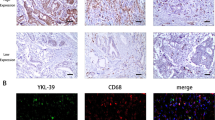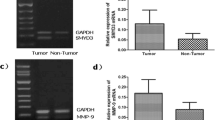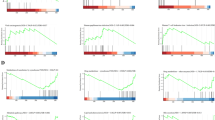Abstract
Background and Aims
The function of human macrophage metalloelastase (HME) also known as matrix metalloproteinase 12, in tumorigenesis is contradictory. The current study was designed to investigate the association of HME expression with angiogenesis and prognosis of gastric carcinomas.
Methods
In situ hybridization and immunohistochemistry were used to detect HME in human gastric carcinomas, chronic gastritis with atypical hyperplasia, and normal gastric epithelium mucosa. The results were further confirmed by RT-PCR or semi-quantitative reverse transcription polymerase chain reaction and Western blotting in gastric carcinomas and paired noncancerous tissues. VEGF and microvessel density count were also detected by immunohistochemical staining in all carcinoma tissues. The prognostic significance of HME was assessed with multiple linear regression analysis and Cox proportional hazards model.
Results
High expression of HME protein/mRNA was observed in gastric carcinomas and atypical hyperplasia tissues compared with normal gastric epithelium mucosa, or paired noncancerous tissues. HME protein/mRNA were negatively correlated with MVD (p < 0.01), VEGF (p < 0.01), tumor differentiation grade (p < 0.05), vascular invasion (p < 0.01), and recurrence (p < 0.05–0.01). HME protein was an independent influential factor of MVD (p < 0.01). HME protein/mRNA was an independent prognostic factor of gastric carcinoma (p < 0.05–0.01). Patients with overexpression of HME protein/mRNA demonstrated a significantly better survival rate compared with those who did not (p < 0.05–0.01).
Conclusions
Overexpression of HME is strongly correlated with the reduced angiogenesis and vascular invasion of gastric carcinoma, and may serve as a useful predictive indicator in patients with this disease.



Similar content being viewed by others
References
Martin MD, Matrisian LM. The other side of MMPs: protective roles in tumor progression. Cancer Metastasis Rev. 2007;26:717–724.
Folgueras AR, Pendás AM, Sánchez LM, López-Otín C. Matrix metalloproteinases in cancer: from new functions to improved inhibition strategies. Int J Dev Biol. 2004;48:411–424.
Vincenti MP, Brinckerhoff CE. Signal transduction and cell-type specific regulation of matrix metalloproteinase gene expression: can MMPs be good for you? J Cell Physiol. 2007;213:355–364.
Rivas MJ, Arii S, Furutani M, et al. Expression of human macrophage metalloelastase gene in hepatocellular carcinoma: correlation with angiostatin generation and its clinical significance. Hepatology. 1998;28:986–993.
Gorrin-Rivas MJ, Arii S, Mori A, et al. Implications of human macrophage metalloelastase and vascular endothelial growth factor gene expression in angiogenesis of hepatocellular carcinoma. Ann Surg. 2000;231:67–73.
Yang W, Arii S, Gorrin-Rivas MJ, Mori A, Onodera H, Imamura M. Human macrophage metalloelastase gene expression in colorectal carcinoma and its clinicopathologic significance. Cancer. 2001;91:1277–1283.
Zucker S, Vacirca J. Role of matrix metalloproteinases (MMPs) in colorectal cancer. Cancer Metastasis Rev. 2004;23:101–117.
Balaz P, Friess H, Kondo Y, Zhu Z, Zimmermann A, Büchler MW. Human macrophage metalloelastase worsens the prognosis of pancreatic cancer. Ann Surg. 2002;235:519–527.
Ding Y, Shimada Y, Gorrin-Rivas MJ, et al. Clinicopathological significance of human macrophage metalloelastase expression in esophageal squamous cell carcinoma. Oncology. 2002;63:378–384.
Yang X, Dong Y, Zhao J, et al. Increased expression of human macrophage metalloelastase (MMP-12) is associated with the invasion of endometrial adenocarcinoma. Pathol Res Pract. 2007;203:499–505.
Zhang H, Li Y, Xu G. Human macrophage metalloelastase expression in gastric cancer and its relationship with gastric cancer prognosis. J Exp Clin Cancer Res. 2007;26:361–366.
Fujita Y, Abe R, Shimizu H. Clinical approaches toward tumor angiogenesis: past, present and future. Curr Pharm Des. 2008;14:3820–3834.
Shapiro SD, Kobayashi DK, Ley TJ. Cloning and characterization of a unique elastolytic metalloproteinase produced by human alveolar macrophages. J Biol Chem. 1993;268:23824–23829.
Salmela MT, Pender SL, Reunala T, MacDonald T, Saarialho-Kere U. Parallel expression of macrophage metalloelastase(MMP-12) in duodenal and skin lesions of patients with dermatitis herpetiformis. Gut. 2001;48:496–502.
Curci JA, Liao SX, Huffman MD, et al. Expression and localization of macrophage elastase (matrix metalloproteinase-12) in abdominal aortic aneurysms. J Clin Invest. 1998;102:1900–1910.
Zhang YJ, Dai Q, Sun DF, et al. mTOR signaling pathway is a target for the treatment of colorectal cancer. Ann Surg Oncol. 2009;16:2617–2628.
Salmela MT, Karjalainen-Lindsberg ML, Puolakkainen P, et al. Upregulation and differential expression of matrilysin (MMP-7) andmetalloelastase (MMP-12) and their inhibitors TIMP-1 and TIMP-3 in Barrett’s oesophageal adenocarcinoma. Br J Cancer. 2001;85:383–392.
Zhang YJ, Dai Q, Wu SM, et al. Susceptibility for NSAIDs-induced apoptosis correlates to p53 gene status in gastric cancer cells. Cancer Invest. 2008;26:868–877.
Morrison CJ, Butler GS, Rodríguez D, Overall CM. Matrix metalloproteinase proteomics: substrates, targets, and therapy. Curr Opin Cell Biol. 2009;21:645–653.
Tu G, Xu W, Huang H, Li S. Progress in the development of matrix metalloproteinase inhibitors. Curr Med Chem. 2008;15:1388–1395.
Georgiadis D, Yiotakis A. Specific targeting of metzincin family members with small-molecule inhibitors: progress toward a multifarious challenge. Bioorg Med Chem. 2008;16:8781–8794.
Poon RT, Fan ST, Wong J. Clinical significance of angiogenesis in gastrointestinal cancers: a target for novel prognostic and therapeutic approaches. Ann Surg. 2003;238:9–28.
Pang RW, Poon RT. Clinical implications of angiogenesis in cancers. Vasc Health Risk Manag. 2006;2:97–108.
Grothey A, Galanis E. Targeting angiogenesis: progress with anti-VEGF treatment with large molecules. Nat Rev Clin Oncol. 2009;6:507–518.
Chu QS. Aflibercept (AVE0005): an alternative strategy for inhibiting tumour angiogenesis by vascular endothelial growth factors. Expert Opin Biol Ther. 2009;9:263–271.
Egeblad M, Werb Z. New functions for the matrix metalloproteinases in cancer progression. Nat Rev Cancer. 2002;2:161–174.
Gorrin-Rivas MJ, Arii S, Furutani M, et al. Mouse macrophage metalloelastase gene transfer into a murine melanoma suppresses primary tumor growth by halting angiogenesis. Clin Cancer Res. 2000;6:1647–1654.
Acknowledgments
This work was supported by grants from the Shanghai Municipal Education Commission (jdy07074, jdy09074) and Shanghai Municipal Science and Technology Commission (07jc14042, 04ZR14065).
Author information
Authors and Affiliations
Corresponding author
Rights and permissions
About this article
Cite this article
Cheng, P., Jiang, F.H., Zhao, L.M. et al. Human Macrophage Metalloelastase Correlates with Angiogenesis and Prognosis of Gastric Carcinoma. Dig Dis Sci 55, 3138–3146 (2010). https://doi.org/10.1007/s10620-010-1127-3
Received:
Accepted:
Published:
Issue Date:
DOI: https://doi.org/10.1007/s10620-010-1127-3




